Fifteenth Amendment to the United States Constitution facts for kids
The Fifteenth Amendment (also called Amendment XV) is an important part of the United States Constitution. It says that the government, both federal and state, cannot stop a citizen from voting because of their race, color, or if they were once a slave. This amendment became law on February 3, 1870. It was the last of three special amendments passed after the Civil War, known as the Reconstruction Amendments.
After the American Civil War, millions of black men who had been enslaved were now free. Many people in Congress, especially Republicans, believed it was important to protect the right of these new citizens to vote. They thought this would help ensure fairness and support for their party. The amendment was approved by Congress on February 26, 1869. It then went to the states for approval. After some debate and opposition, it was officially added to the Constitution on March 30, 1870.
For many years, the U.S. Supreme Court interpreted this amendment very strictly. In the late 1800s, states in the Southern United States created new laws, often called "Jim Crow laws". These laws made it very hard for black citizens and even some poor white citizens to vote. They used things like poll taxes (fees to vote) and literacy tests (reading tests). White voters often avoided these rules because of "grandfather clauses." Groups also used threats and violence to stop black people from voting.
Later, in the 1900s, the Supreme Court started to interpret the amendment more broadly. They struck down unfair rules like grandfather clauses and the "white primary" system. Other amendments also helped expand voting rights. These included the Nineteenth Amendment (giving women the right to vote in 1920). The Twenty-fourth Amendment (banning poll taxes in federal elections in 1964) also helped. The Twenty-sixth Amendment (lowering the voting age to 18 in 1971) was another step. A very important law, the Voting Rights Act of 1965, gave the federal government power to stop voting discrimination.
Contents
What is the Fifteenth Amendment?
The Amendment's Words
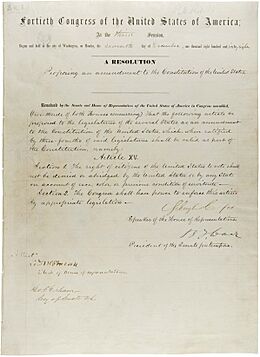
This is what the Fifteenth Amendment says:
Section 1. The right of citizens of the United States to vote shall not be denied or abridged by the United States or by any State on account of race, color, or previous condition of servitude.
Section 2. The Congress shall have power to enforce this article by appropriate legislation.
In simple terms, Section 1 means that no one can be stopped from voting because of their race, skin color, or if they were once a slave. Section 2 means that Congress has the power to make laws to ensure this right is protected.
Why Was This Amendment Needed?
After the Civil War
After the American Civil War ended in 1865, slavery was abolished by the Thirteenth Amendment. Millions of black people, who had been enslaved, were now free citizens. However, many Southern states quickly passed "Black Codes." These laws tried to limit the freedom of former slaves. They restricted where black people could live and work. They also tried to stop them from owning weapons or speaking in court.
Protecting New Freedoms
Congress wanted to make sure that these new citizens had full rights. In 1866, Congress passed a law to guarantee citizenship for all, regardless of race. This law also aimed to give everyone equal access to the legal system. However, President Andrew Johnson disagreed and tried to stop the law. Congress overrode his veto, meaning they passed the law anyway.
This experience showed that a stronger, permanent solution was needed. So, in 1866, the Fourteenth Amendment was adopted. It guaranteed citizenship and equal protection under the law for everyone. But even the Fourteenth Amendment didn't fully guarantee voting rights for black men. It allowed states to reduce their representation in Congress if they stopped men over 21 from voting. This meant states could still deny voting rights based on race without a direct ban.
How the Amendment Was Created
Debates and Decisions
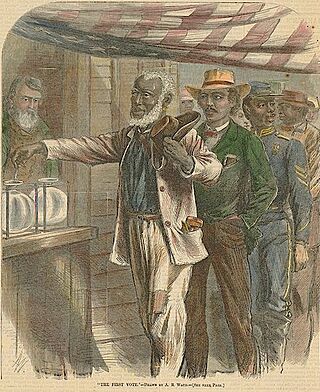
Republicans in Congress wanted to pass an amendment that would protect the voting rights of black men. There were many debates about how broad this amendment should be. Some wanted to ban restrictions based on education or property. Others wanted to keep restrictions on foreign-born citizens. In the end, lawmakers agreed on a simpler text. It banned denying the right to vote only because of "race, color, or previous condition of servitude." This meant it didn't mention things like poll taxes or literacy tests.
The House of Representatives approved this version on February 25, 1869. The Senate approved it the next day. Most Republicans voted for it, while most Democrats voted against it. Some Republicans didn't vote because they felt the amendment didn't go far enough. They wanted it to ban literacy tests and poll taxes too.
States Say Yes
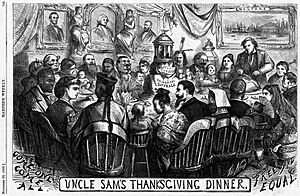
After Congress approved the amendment, it needed to be ratified by three-fourths of the states. This was a challenging process. One group that opposed the amendment was the women's suffrage movement. They had worked with those who wanted to end slavery. However, the Fifteenth Amendment only protected voting rights for men, not women. This caused strong disagreements among women's rights activists.
Nevada was the first state to ratify the amendment on March 1, 1869. Many New England and Midwest states quickly followed. President Ulysses S. Grant strongly supported the amendment. He encouraged states to ratify it quickly. Some Southern states, still under federal control after the war, also ratified it. By February 3, 1870, enough states had approved the amendment for it to become law.
The first twenty-eight states to ratify the Fifteenth Amendment were:
- Nevada: March 1, 1869
- West Virginia: March 3, 1869
- North Carolina: March 5, 1869
- Illinois: March 5, 1869
- Louisiana: March 5, 1869
- Michigan: March 8, 1869
- Wisconsin: March 9, 1869
- Maine: March 11, 1869
- Massachusetts: March 12, 1869
- Arkansas: March 15, 1869
- South Carolina: March 15, 1869
- Pennsylvania: March 25, 1869
- New York: April 14, 1869 (Later tried to withdraw approval, but re-ratified on March 30, 1970)
- Indiana: May 14, 1869
- Connecticut: May 19, 1869
- Florida: June 14, 1869
- New Hampshire: July 1, 1869
- Virginia: October 8, 1869
- Vermont: October 20, 1869
- Alabama: November 16, 1869
- Missouri: January 10, 1870
- Minnesota: January 13, 1870
- Mississippi: January 17, 1870
- Rhode Island: January 18, 1870
- Kansas: January 19, 1870
- Ohio: January 27, 1870
- Georgia: February 2, 1870
- Iowa: February 3, 1870
Secretary of State Hamilton Fish officially certified the amendment on March 30, 1870. This included the ratifications of:
Other states ratified the amendment much later, some even in the 20th century.
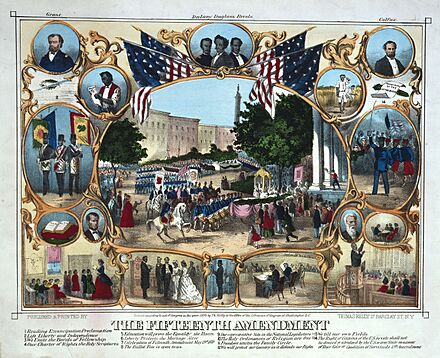
The adoption of the amendment was a huge cause for celebration in black communities. Many people felt that the rights of black Americans were now secure. President Grant called it "the greatest civil change" since the nation began.
How the Amendment Was Used (and Challenged)
Early Years and Challenges
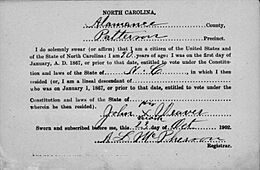
After the amendment passed, many black men, including former slaves, began to vote. During the Reconstruction period, many black men were elected to local, state, and even federal offices. However, groups that believed white people were superior, like the Ku Klux Klan (KKK), used violence and threats to stop black people from voting. Congress passed laws to try and stop these actions.
The Supreme Court first interpreted the Fifteenth Amendment in 1876. They read it very narrowly. They said the amendment didn't *give* people the right to vote. Instead, it only stopped states from discriminating based on race when people voted. This allowed states to create rules that seemed fair but were actually designed to stop black people from voting. These rules included poll taxes, literacy tests, and "grandfather clauses." A grandfather clause allowed someone to vote if their grandfather could vote before 1867. This meant most white men could vote, but most black men could not.
After 1877, federal troops left the South. This allowed white Democratic governments to pass more "Jim Crow laws" that discriminated against black people. These laws made it even harder for black men to vote.
Fighting for Fair Voting
In the 20th century, the Supreme Court began to interpret the Fifteenth Amendment more broadly. In 1915, they struck down grandfather clauses, calling them discriminatory. They also challenged the "white primary" system. This system allowed only white people to vote in primary elections, which effectively decided who would win the general election. Over several cases, the Court ruled that these white primaries violated the Fifteenth Amendment.
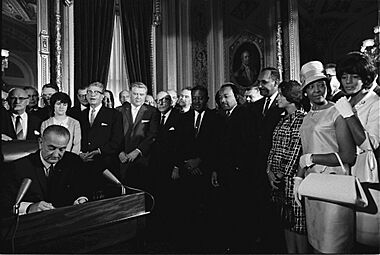
The Court also used the amendment to stop unfair gerrymandering. This is when voting districts are redrawn to reduce the power of certain groups. For example, in 1960, the Court ruled that redrawing city limits to exclude black voters was illegal.
Even though the Fifteenth Amendment didn't ban poll taxes directly, other actions helped. The Twenty-fourth Amendment banned poll taxes in federal elections in 1964. In 1966, the Supreme Court ruled that state poll taxes were also unconstitutional.
Modern Protections for Voting Rights
Congress used its power from the Fifteenth Amendment to pass the very important Voting Rights Act of 1965. This law aimed to achieve greater racial equality in voting. It banned literacy tests and other unfair practices. It also required some states and local governments with a history of discrimination to get federal approval for any changes to their voting laws. This process was called "preclearance." This law greatly increased black voter registration in the South.
In 2013, the Supreme Court made a decision in the case Shelby County v. Holder. The Court ruled that the part of the Voting Rights Act that determined which areas needed federal approval for voting changes was no longer constitutional. The Court said that the Fifteenth Amendment's goal is to ensure a better future, not to punish the past. They felt that the widespread discrimination of 1965 was no longer present. However, many people, including Justice Ruth Bader Ginsburg, disagreed. They argued that removing preclearance was like "throwing away your umbrella in a rainstorm because you are not getting wet." This decision meant that Congress would need to create a new way to identify areas needing special oversight.
The history of the Fifteenth Amendment shows that rights can be gained, but they also need constant protection.
Related Topics
- Ballot access
- Black suffrage
- Nineteenth Amendment to the United States Constitution (1920, gave women the right to vote)
- Twenty-sixth Amendment to the United States Constitution (1971, set the voting age at 18)
See also
 In Spanish: Decimoquinta Enmienda a la Constitución de los Estados Unidos para niños
In Spanish: Decimoquinta Enmienda a la Constitución de los Estados Unidos para niños
 | Percy Lavon Julian |
 | Katherine Johnson |
 | George Washington Carver |
 | Annie Easley |

